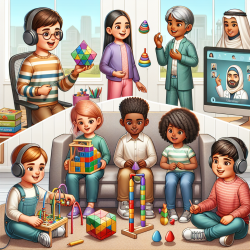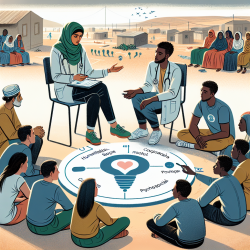Introduction
As practitioners in the field of speech-language pathology, we are constantly seeking ways to enhance our services and outcomes for children, especially in diverse communities. The recent study, "The Orthodox Jewish Community and the Coronavirus: Halacha Grapples with the Pandemic," provides valuable insights into how a specific community adapted to unprecedented challenges. By understanding these adaptations, we can improve our online therapy services, particularly in communities with unique cultural and religious practices.
Understanding Community-Specific Needs
The research highlights how the Orthodox Jewish community balanced adherence to Halacha (Jewish law) with the need for flexibility during the COVID-19 pandemic. This balance was achieved through innovative uses of technology and adjustments in communal practices. As practitioners, recognizing the importance of cultural and religious considerations is crucial. This understanding allows us to tailor our online therapy services to meet the specific needs of diverse communities, ensuring that cultural values are respected while providing effective therapeutic interventions.
Implementing Research Outcomes
Here are some key takeaways from the research that can be applied to improve online therapy services:
- Flexibility and Adaptation: The Orthodox community demonstrated flexibility by adopting technology for religious practices. Similarly, online therapy platforms should offer flexible scheduling and customizable interfaces to accommodate the unique needs of each community.
- Cultural Sensitivity: Understanding and respecting cultural norms and practices is essential. For instance, being aware of religious observances and holidays can help in scheduling sessions and developing culturally appropriate therapy materials.
- Community Engagement: The study emphasizes the importance of community support. Online therapy services can enhance outcomes by involving community leaders and families in the therapeutic process, fostering a supportive environment for children.
Encouraging Further Research
While the study provides valuable insights, it also highlights the need for further research in understanding diverse communities. Practitioners are encouraged to engage in research that explores the intersection of cultural practices and therapeutic interventions. By contributing to this growing body of knowledge, we can develop more effective, culturally competent therapy services.
Conclusion
The study on the Orthodox Jewish community's response to the COVID-19 pandemic offers valuable lessons for speech-language pathologists and online therapy providers. By incorporating cultural sensitivity, flexibility, and community engagement into our practices, we can enhance therapy outcomes for children in diverse communities. As we continue to navigate the challenges of providing online therapy, let us remain committed to data-driven decisions and culturally informed practices.
To read the original research paper, please follow this link: The Orthodox Jewish Community and the Coronavirus: Halacha Grapples with the Pandemic.










